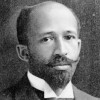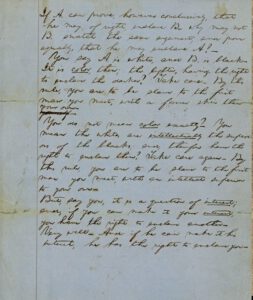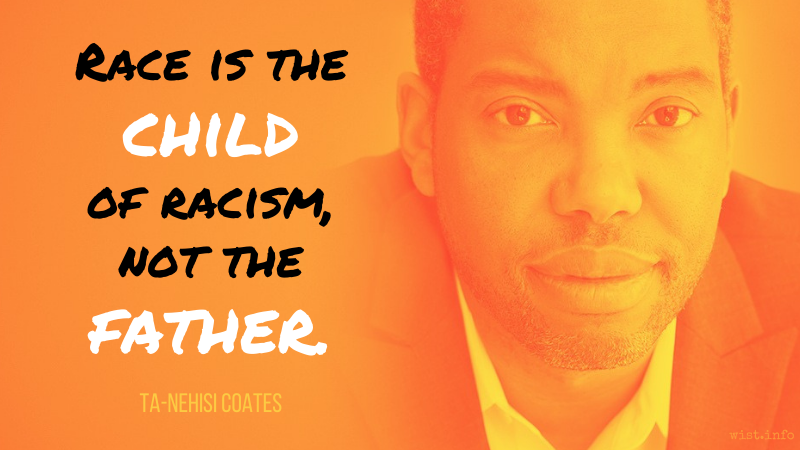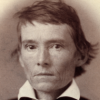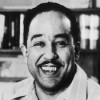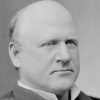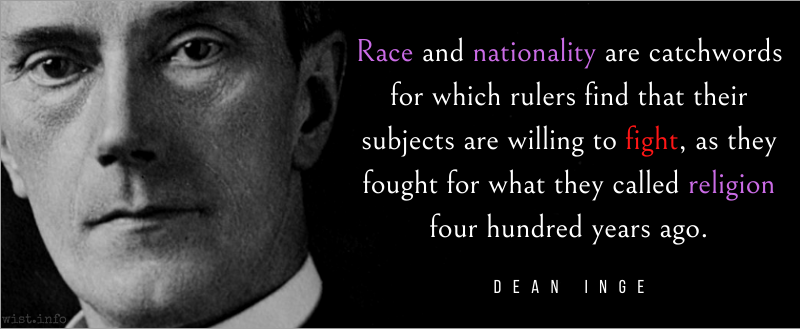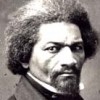What I have come to recognize is that just as “the black problem” turned out to be a problem of white racism, just as “the woman problem” turned out to be a problem of male sexism, so “the homosexual problem” is really the homophobia of many heterosexuals.
William Sloane Coffin, Jr. (1924-2006) American minister, social activist
The Courage to Love, ch. 5 (1982)
(Source)
Quotations about:
racism
Note not all quotations have been tagged, so Search may find additional quotes on this topic.
My first job after college was as a teacher in Cotulla, Texas, in a small Mexican-American school. Few of them could speak English, and I couldn’t speak much Spanish. My students were poor and they often came to class without breakfast, hungry. They knew even in their youth the pain of prejudice. They never seemed to know why people disliked them. But they knew it was so, because I saw it in their eyes. I often walked home late in the afternoon, after the classes were finished, wishing there was more that I could do. But all I knew was to teach them the little that I knew, hoping that it might help them against the hardships that lay ahead.
Somehow you never forget what poverty and hatred can do when you see its scars on the hopeful face of a young child.Lyndon B. Johnson (1908-1973) American politician, educator, US President (1963-69)
Speech (1965-03-15), “The American Promise,” Joint Session of Congress [40:55]
(Source)
Experience has clearly shown that the existing process of law cannot overcome systematic and ingenious discrimination. No law that we now have on the books — and I have helped to put three of them there — can ensure the right to vote when local officials are determined to deny it.
In such a case our duty must be clear to all of us. The Constitution says that no person shall be kept from voting because of his race or his color. We have all sworn an oath before God to support and to defend that Constitution. We must now act in obedience to that oath.Lyndon B. Johnson (1908-1973) American politician, educator, US President (1963-69)
Speech (1965-03-15), “The American Promise,” Joint Session of Congress [14:20]
(Source)
Many of the issues of civil rights are very complex and most difficult. But about this there can and should be no argument. Every American citizen must have an equal right to vote. There is no reason which can excuse the denial of that right. There is no duty which weighs more heavily on us than the duty we have to ensure that right.
Yet the harsh fact is that in many places in this country men and women are kept from voting simply because they are Negroes.
Every device of which human ingenuity is capable has been used to deny this right. The Negro citizen may go to register only to be told that the day is wrong, or the hour is late, or the official in charge is absent. And if he persists, and if he manages to present himself to the registrar, he may be disqualified because he did not spell out his middle name or because he abbreviated a word on the application.
And if he manages to fill out an application he is given a test. The registrar is the sole judge of whether he passes this test. He may be asked to recite the entire Constitution, or explain the most complex provisions of State law. And even a college degree cannot be used to prove that he can read and write.
For the fact is that the only way to pass these barriers is to show a white skin.Lyndon B. Johnson (1908-1973) American politician, educator, US President (1963-69)
Speech (1965-03-15), “The American Promise,” Joint Session of Congress [11:51]
(Source)
There is no Negro problem. There is no Southern problem. There is no Northern problem. There is only an American problem. And we are met here tonight as Americans — not as Democrats or Republicans — we are met here as Americans to solve that problem.
This was the first nation in the history of the world to be founded with a purpose. The great phrases of that purpose still sound in every American heart, North and South: “All men are created equal” — “government by consent of the governed” — “give me liberty or give me death.” Well, those are not just clever words, or those are not just empty theories. In their name Americans have fought and died for two centuries, and tonight around the world they stand there as guardians of our liberty, risking their lives.
Those words are a promise to every citizen that he shall share in the dignity of man. This dignity cannot be found in a man’s possessions; it cannot be found in his power, or in his position. It really rests on his right to be treated as a man equal in opportunity to all others. It says that he shall share in freedom, he shall choose his leaders, educate his children, and provide for his family according to his ability and his merits as a human being.
To apply any other test — to deny a man his hopes because of his color or race, his religion or the place of his birth — is not only to do injustice, it is to deny America and to dishonor the dead who gave their lives for American freedom.Lyndon B. Johnson (1908-1973) American politician, educator, US President (1963-69)
Speech (1965-03-15), “The American Promise,” Joint Session of Congress [07:41]
(Source)
In our time we have come to live with moments of great crisis. Our lives have been marked with debate about great issues; issues of war and peace, issues of prosperity and depression. But rarely in any time does an issue lay bare the secret heart of America itself. Rarely are we met with a challenge, not to our growth or abundance, our welfare or our security, but rather to the values and the purposes and the meaning of our beloved Nation.
The issue of equal rights for American Negroes is such an issue. And should we defeat every enemy, should we double our wealth and conquer the stars, and still be unequal to this issue, then we will have failed as a people and as a nation.Lyndon B. Johnson (1908-1973) American politician, educator, US President (1963-69)
Speech (1965-03-15), “The American Promise,” Joint Session of Congress [06:27]
(Source)
At times history and fate meet at a single time in a single place to shape a turning point in man’s unending search for freedom. So it was at Lexington and Concord. So it was a century ago at Appomattox. So it was last week in Selma, Alabama.
There, long-suffering men and women peacefully protested the denial of their rights as Americans. Many were brutally assaulted. One good man, a man of God, was killed.
There is no cause for pride in what has happened in Selma. There is no cause for self-satisfaction in the long denial of equal rights of millions of Americans. But there is cause for hope and for faith in our democracy in what is happening here tonight.
For the cries of pain and the hymns and protests of oppressed people have summoned into convocation all the majesty of this great Government — the Government of the greatest Nation on earth.Lyndon B. Johnson (1908-1973) American politician, educator, US President (1963-69)
Speech (1965-03-15), “The American Promise,” Joint Session of Congress [04:25]
(Source)
A nationally broadcast address, introducing the Voting Rights Act of 1965. The mention of Selma is in reference to the events of "Bloody Sunday" on 7 March 1965.
Liberty trains for liberty. Responsibility is the first step in responsibility.
W. E. B. Du Bois (1868-1963) American writer, historian, social reformer [William Edward Burghardt Du Bois]
John Brown, ch. 13 “The Legacy of John Brown” (1909)
(Source)
On the policy among white colonial powers that non-whites "ought to be under the restraint and benevolent tutelage of stronger and wiser nations for their own benefit," until they are "capable" of being free.
Maybe the purpose of this sorry and tragic error committed in my native Mississippi by two white adults on an afflicted Negro child is to prove to us whether or not we deserve to survive. Because if we in America have reached that point in our desperate culture when we must murder children, no matter for what reason or what color, we don’t deserve to survive, and probably won’t.
William Faulkner (1897-1962) American novelist
“The Art of Fiction,” Interview by Jean Stein, Paris Review #12 (Spring 1956)
(Source)
Regarding the Emmett Till murder.
Race hatred is one of the most cruel and least civilised emotions to which men in the mass are liable, and it is of the utmost importance for human progress that every possible method of diminishing it should be adopted.
Bertrand Russell (1872-1970) English mathematician and philosopher
“On Race Hatred,” New York American (1933-05-24)
(Source)
We must not allow Negroes to be men, lest we ourselves should be suspected of not being Christians.
Charles-Lewis de Secondat, Baron de Montesquieu (1689-1755) French political philosopher
The Spirit of Laws [De l’esprit des lois], Vol. 1, Book 15, ch. 5 (1748)
In a satirical set of justifications for slavery of Africans (an institution Montesquieu generally condemned).
This form of the phrase was commonly used by American abolitionists, e.g., used as an epigram in Lydia Maria Child, An Appeal in Favor of That Class of Americans Called Africans, ch. 6 (1836).
French original text:
Il est impossible que nous supposions que ces gens-là soient des hommes, parce que, si nous les supposions des hommes, on commencerait à croire que nous ne sommes pas nous-mêmes chrétiens.
Alternate translations:
It is impossible for us to suppose these creatures to be men, because allowing them to be men, a suspicion would follow, that we ourselves are not Christians.
[tr. Nugent (1758 ed.)]
It is impossible for us to assume that these people are men because if we assumed they were men one would begin to believe that we ourselves were not Christians.
[tr. Cohler/Miller/Stone (1989)]
In the first place, an unjust law exists in this Commonwealth [of Massachusetts], by which marriages between persons of different color is pronounced illegal. I am perfectly aware of the gross ridicule to which I may subject myself by alluding to this particular; but I have lived too long, and observed too much, to be disturbed by the world’s mockery. In the first place, the government ought not to be invested with power to control the affections, any more than the consciences of citizens. A man has at least as good a right to choose his wife, as he has to choose his religion. His taste may not suit his neighbors; but so long as his deportment is correct, they have no right to interfere with his concerns.
Lydia Maria Child (1802-1880) American abolitionist, activist, journalist, suffragist
An Appeal on Behalf of That Class of Americans Called Africans, ch. 8 (1833)
(Source)
There is a separation of colored people from white people in the United States. That separation is not a disease of colored people. It is a disease of white people. I do not intend to be quiet about it.
Albert Einstein (1879-1955) German-American physicist
Speech, Lincoln University, Pennsylvania (3 May 1946)
(Source)
As reported in the the Baltimore Afro-American (11 May 1946). There was essentially no mainstream (white) press coverage of his visit to the Black college, or transcript of his ten minutes of remarks. No copy of his speech or notes has been found.
Sometimes paraphrased, "The separation of races is not a disease of ...."
I happen to think the singular evil of our time is prejudice. It is from this evil that all other evils grow and multiply. In almost everything I’ve written there is a thread of this: man’s seemingly palpable need to dislike someone other than himself.
Rod Serling (1924-1975) American screenwriter, playwright, television producer, narrator
“Serling in Creative Mainstream,” interview by Ellen Cameron May, Los Angeles Times (1967-06-25)
(Source)
Quoted in Anne Serling, As I Knew Him: My Dad, Rod Serling, ch. 8 (2013).
Today, as in ages past, we are not without tragic proof that the exalted power of some governments to punish manufactured crime dictatorially is the handmaid of tyranny. Under our constitutional system, courts stand against any winds that blow as havens of refuge for those who might otherwise suffer because they are helpless, weak, outnumbered, or because they are non-conforming victims of prejudice and public excitement. Due process of law, preserved for all by our Constitution, commands that no such practice as that disclosed by this record shall send any accused to his death. No higher duty, no more solemn responsibility, rests upon this Court, than that of translating into living law and maintaining this constitutional shield deliberately planned and inscribed for the benefit of every human being subject to our Constitution — of whatever race, creed or persuasion.
Hugo Black (1886-1971) American politician and jurist, US Supreme Court Justice (1937-71)
Chambers v. Florida, 309 U.S. 227, 241 (1940) [majority opinion]
(Source)
Finding coerced confessions that led to the death penalty conviction of four Black men in Florida were a violation of the Due Process clause of the 14th Amendment.
It’s simply a national acknowledgement that in any kind of priority, the needs of human beings must come first. Poverty is here and now. Hunger is here and now. Racial tension is here and now. Pollution is here and now. These are the things that scream for a response. And if we don’t listen to that scream — and if we don’t respond to it — we may well wind up sitting amidst our own rubble, looking for the truck that hit us — or the bomb that pulverized us. Get the license number of whatever it was that destroyed the dream. And I think we will find that the vehicle was registered in our own name.
Rod Serling (1924-1975) American screenwriter, playwright, television producer, narrator
Commencement Address, University of Southern California (17 Mar 1970)
(Source)
In Anne Serling, As I Knew Him: My Dad, Rod Serling, ch. 28 (2013).
Are you tough enough to face one of the uglier stains upon the fabric of our democracy, prejudice? It’s the basic root of most evil. It’s a part of the sickness of man. And it’s a part of man’s admission, his constant sick admission, that to exist he must find a scapegoat. To explain away his own deficiencies, he must try to find someone who he believes more deficient. If you find yourself thinking words like “Nigger”, or “Kike”, or “Pollock”, or “Wop”, or “Bohunk”, or “Sheenie”, or “Dago”, consign them to the lexicon of race-haters who aren’t fit to breathe the same air as you are. Make your judgment of your fellow-man on what he says and what he believes and the way he acts. Be tough enough, please, to live with prejudice and give battle to it. It warps, it poisons, it distorts and it is self-destructive. It has fallout worse than a bomb … and worst of all it cheapens and demeans anyone who permits himself the luxury of hating.
Rod Serling (1924-1975) American screenwriter, playwright, television producer, narrator
Commencement Address, Binghamton Central High School, Binghamton, New York (28 Jan 1968)
(Source)
If modern technology and all the tendencies of modern society make nationalism illogical, why does it persist?
You might as well ask why racism flourishes in the face of scientific evidence that there are no real differences between the races, or why Protestantism and Catholicism remain separate when the differences between them can be detected only by theologians. Such things are deeply rooted in the psychology of man. When you’re raised to believe in the superiority of your own country, it’s very difficult to rid yourself of the belief. There are, of course, practical advantages to national organization, and out of these loyalties develop. There’s no reason in and of itself why other institutions should not attract comparable loyalties , but so far they have not. I’m not at all sure they’d be any better.
There is a bitter sadness and special irony that attends the passing of Martin Luther King. Quickly and with ease, we offer up a chorus of posthumous praise — the ritual dirge so time-honored and comfortable and undemanding of anything but rhetoric. In death, we offer the acknowledgement of the man and his dream that we denied him in life.
In his grave, we praise him for his decency — but when he walked amongst us, we responded with no decency of our own. When he suggested that all men should have a place in the sun — we put a special sanctity on the right of ownership and the privilege of prejudice by maintaining that to deny homes to Negroes was a democratic right.
Now we acknowledge his compassion — but we exercised no compassion of our own. When he asked us to understand that men take to the streets out of anguish and hopelessness and a vision of that dream dying, we bought guns and speculated about roving agitators and subversive conspiracies and demanded law and order.
We felt anger at the effects, but did little to acknowledge the causes. We extol all the virtues of the man — but we chose not to call them virtues before his death. And now, belatedly, we talk of this man’s worth — but the judgment comes late in the day as part of a eulogy when it should have been made a matter of record while he existed as a living force.
Rod Serling (1924-1975) American screenwriter, playwright, television producer, narrator
Letter to the Editor, Los Angeles Times (8 Apr 1968)
(Source)
Quoted in Anne Serling, As I Knew Him: My Dad, Rod Serling (2013).
If A. can prove, however conclusively, that he may, of right, enslave B. — why may not B. snatch the same argument, and prove equally, that he may enslave A?
You say A. is white, and B. is black. It is color, then; the lighter having the right to enslave the darker? Take care. By this rule, you are to be slave to the first man you meet, with a fairer skin than your own.
You do not mean color exactly? — You mean the whites are intellectually the superior of blacks, and, therefore, have the right to enslave them? Take care again. By this rule, you are to be slave to the first man you meet, with an intellect superior to your own.
But, say you, it is a question of interest; and, if you can make it your interest, you have the right to enslave another. Very well. And if he can make it his interest, he has the right to enslave you.
Abraham Lincoln (1809-1865) American lawyer, politician, US President (1861-65)
Fragment on Slavery (c. 1854)
(Source)
To many white Americans, President Obama must have been corrupt, because his very occupation of the White House was a kind of corruption of the traditional order. When women attain positions of political power usually reserved for men — or when Muslims, blacks, Jews, homosexuals, or “cosmopolitans” profit or even share the public goods of a democracy, such as healthcare — that is perceived as corruption.
Jason Stanley (b. 1969) American philosopher, epistemologist, academic
How Fascism Works: The Politics of Us and Them, ch. 2 (2018)
(Source)
For the fascist, schools and universities are there to indoctrinate national or racial pride, conveying for example (where nationalism is racialized) the glorious achievements of the dominant race.
Jason Stanley (b. 1969) American philosopher, epistemologist, academic
How Fascism Works: The Politics of Us and Them, ch. 4 (2018)
(Source)
Fascist law-and-order rhetoric is explicitly meant to divide citizens into two classes: those of the chosen nation, who are lawful by nature, and those who are not, who are inherently lawless. In fascist politics, women who do not fit traditional gender roles, nonwhites, homosexuals, immigrants, “decadent cosmopolitans,” those who do not have the dominant religion, are in their very existence violations of law and order. By describing black Americans as a threat to law and order, demagogues in the United States have been able to create a strong sense of white national identity that requires protection from the nonwhite “threat.”
Jason Stanley (b. 1969) American philosopher, epistemologist, academic
How Fascism Works: The Politics of Us and Them, ch. 7 (2018)
(Source)
Race is the child of racism, not the father.
Ta-Nehisi Coates (b. 1975) American writer, journalist, educator
Between the World and Me, ch. 1 (2015)
(Source)
Coates continues:
And the process of naming "the people" has never been a matter of genealogy and physiognomy so much as one of hierarchy. Difference in hue and hair is old. But the belief in the preeminence of hue and hair, the notion that these factors can correctly organize a society and that they signify deeper attributes, which are indelible -- this is the new idea at the heart of these new people who have been brought up hopelessly, tragically, deceitfully, to believe that they are white.
It is among the evils of slavery that it taints the very sources of moral principle. It establishes false estimates of virtue and vice: for what can be more false and heartless than this doctrine which makes the first and holiest rights of humanity to depend upon the color of the skin?
John Quincy Adams (1767-1848) US President (1825-29)
Journal (3 Mar 1820)
(Source)
Discussing the debate over the Missouri Compromise.
But we are as other men, exactly. Of one blood, one species, one brain, one figure, one fundamental set of collective instincts, one solitary body of information, one everything. Superiority and inferiority are individual, not racial or national.
What vitiates nearly all that is written about antisemitism is the assumption in the writer’s mind that he himself is immune to it. “Since I know that antisemitism is irrational,” he argues, “it follows that I do not share it.” He thus fails to start his investigation in the one place where he could get hold of some reliable evidence — that is, in his own mind.
George Orwell (1903-1950) English writer [pseud. of Eric Arthur Blair]
“Antisemitism in Britain,” Contemporary Jewish Record (1945-04)
(Source)
Americans today often speak of racial prejudice as a thing that simply exists — like air — with no nod to the actual work it takes to create and maintain systems based upon prejudice.
Annette Gordon-Reed (b. 1958) American historian, law professor, author
“The Captive Aliens Who Remain Our Shame,” New York Review of Books (19 Jan 2017)
(Source)
The new constitution has put at rest, forever, all the agitating questions relating to our peculiar institution — African slavery as it exists amongst us — the proper status of the negro in our form of civilization. This was the immediate cause of the late rupture and present revolution. […] The prevailing ideas entertained by [Jefferson] and most of the leading statesmen at the time of the formation of the old constitution, were that the enslavement of the African was in violation of the laws of nature; that it was wrong in principle, socially, morally, and politically. It was an evil they knew not well how to deal with, but the general opinion of the men of that day was that, somehow or other in the order of Providence, the institution would be evanescent and pass away. […] Our new government is founded upon exactly the opposite idea; its foundations are laid, its corner-stone rests upon the great truth, that the negro is not equal to the white man; that slavery — subordination to the superior race — is his natural and normal condition. This, our new government, is the first, in the history of the world, based upon this great physical, philosophical, and moral truth.
Alexander Stephens (1812-1883) American lawyer, politician, Confederate States Vice-President (1861-65)
“Cornerstone Speech,” Savannah (21 Mar 1861)
(Source)
On the foundation of the government of the Confederate States of America.
Racism in America is like dust in the air. It seems invisible — even if you’re choking on it — until you let the sun in. Then you see it’s everywhere.
Kareem Abdul-Jabbar (b. 1947) American athlete [b. Lew Alcindor]
“Don’t understand the protests? What you’re seeing is people pushed to the edge,” op-ed, Los Angeles Times (30 May 2020)
(Source)
There can be no permanent disfranchised peasantry in the United States. Freedom can never yield its fullness of blessings so long as the law or its administration places the smallest obstacle in the pathway of any virtuous citizen.
James A. Garfield (1831-1881) US President (1881), lawyer, lay preacher, educator
Inaugural address (4 Mar 1881)
(Source)
It comes as a great shock around the age of 5, or 6, or 7, to discover that the flag to which you have pledged allegiance, along with everybody else, has not pledged allegiance to you.
James Baldwin (1924-1987) American novelist, playwright, activist
“The American Dream is at the Expense of the American Negro,” opening comments, Cambridge Union, Cambridge, England (1965-02-17)
(Source)
Debate with William F. Buckley, Jr.
I swear to the Lord
I still can’t see
Why Democracy means
Everybody but me.Langston Hughes (1902-1967) American poet, social activist, novelist, playwright
“The Black Man Speaks,” Jim Crow’s Last Stand (1943)
(Source)
Being a star has made it possible for me to get insulted in places where the average Negro could never hope to go and get insulted.
Sammy Davis, Jr. (1925-1990) American singer, dancer, actor, comedian
Yes I Can, Part 3, ch. 3 (1965)
(Source)
At the root of the American Negro problem is the necessity of the American White man to find a way of living with the Negro in order to be able to live with himself.
James Baldwin (1924-1987) American novelist, playwright, activist
“Stranger in a Village,” Harper’s Magazine (Oct 1953)
(Source)
Reprinted in Notes of a Native Son (1955).
What we need in the United States is not division; what we need in the United States is not hatred; what we need in the United States is not violence or lawlessness; but love and wisdom, and compassion toward one another, and a feeling of justice toward those who still suffer within our country, whether they be white or they be black.
Robert Francis Kennedy (1925-1968) American politician
Statement on the Assassination of Martin Luther King, Jr., Indianapolis (1968-04-04)
(Source)
Men of all races have always sought for a convincing explanation of their own astonishing excellence and they have frequently found what they were looking for.
Aubrey Menen (1912-1989) British writer, novelist, satirist, theatre critic
Dead Man in the Silver Market, ch. 1, opening lines (1954)
(Source)
Let us not commit ourselves to the absurd and senseless dogma that the color of the skin shall be the basis of suffrage, the talisman of liberty.
James A. Garfield (1831-1881) US President (1881), lawyer, lay preacher, educator
“Suffrage and Safety,” speech, Ravenna, Ohio (4 Jul 1865)
(Source)
It is a measure of the Negro’s circumstance that, in America, the smallest things usually take him so very long, and that, by the time he wins them, they are no longer little things: they are miracles.
Murray Kempton (1917-1997) American journalist.
Part of Our Time: Some Ruins & Monuments of the Thirties, ch. 8 (1955)
(Source)
On the formation of the Pullman Porters union.
But in view of the Constitution, in the eye of the law, there is in this country no superior, dominant, ruling class of citizens. There is no caste here. Our Constitution is color-blind, and neither knows nor tolerates classes among citizens. In respect of civil rights, all citizens are equal before the law. The humblest is the peer of the most powerful. The law regards man as man, and takes no account of his surroundings or of his color when his civil rights as guaranteed by the supreme law of the land are involved.
John Marshall Harlan (1833-1911) American lawyer, politician, Supreme Court Justice (1877-1911)
Plessy v. Ferguson 163 U.S. 537, 559 (1896) [dissent]
(Source)
Race and nationality are catchwords for which rulers find that their subjects are willing to fight, as they fought for what they called religion four hundred years ago.
William Ralph Inge (1860-1954) English prelate [Dean Inge]
“The Future of the English Race,” Galton Lecture (1919), Outspoken Essays: First Series (1920)
(Source)
In the post–civil rights era, we have been taught that racists are mean people who intentionally dislike others because of their race; a racist is consciously prejudiced and intends to be hurtful. Because this definition requires conscious intent, it exempts virtually all white people and functions beautifully to obscure and protect racism as a system in which we are all implicated.
Robin DiAngelo (b. 1956) American academic, lecturer, author
White Fragility, Introduction (2018)
(Source)
“If you give a nigger an inch, he will take an ell. A nigger should know nothing but to obey his master — to do as he is told to do. Learning will spoil the best nigger in the world. Now, if you teach that nigger how to read, there would be no keeping him. It would forever unfit him to be a slave. He would at once become unmanageable, and of no value to his master. As to himself, it could do him no good, but a great deal of harm. It would make him discontented and unhappy.”
Frederick Douglass (1817-1895) American abolitionist, orator, writer
Narrative of the Life of Frederick Douglass, ch. 6 (1845)
(Source)
Quoting his master, Auld, chastising Mrs. Auld for teaching Douglass to read. Frequently paraphrased down to "Knowledge makes a man unfit to be a slave."
Whenever racial discrimination exists it is a tragic expression of man’s spiritual degeneracy and moral bankruptcy. Therefore, it must be removed not merely because it is diplomatically expedient, but because it is morally compelling.
Martin Luther King, Jr. (1929-1968) American clergyman, civil rights leader, social activist, preacher
“The Rising Tide of Racial Consciousness,” Speech, National Urban League, New York (6 Sep 1960)
(Source)
To be a Negro in this country and to be relatively conscious is to be in a rage almost all the time.
James Baldwin (1924-1987) American novelist, playwright, activist
In “The Negro After Watts,” Time (27 Aug 1965)
(Source)
Article placed in the Congressional Record by Robert Byrd (24 Aug 1965).
Negroes are not the only poor in the nation. There are nearly twice as many white poor as Negro, and therefore the struggle against poverty is not involved solely with color or racial discrimination but with elementary economic justice.
Martin Luther King, Jr. (1929-1968) American clergyman, civil rights leader, social activist, preacher
Speech to Shop Stewards, Local 815, Teamsters and the Allied Trades Council, New York City (2 May 1967)
(Source)
“To Hell with all racialists,” she said aloud. “And to Hell with eugenics, degenerate heredity, miscegenation and frauds who pile up skulls like a conqueror as well. May they choke on their bones.”
It is not a threat but a fact of history that if an oppressed people’s pent-up emotions are not nonviolently released, they will be violently released. So let the Negro march. Let him make pilgrimages to city hall. Let him go on freedom rides. And above all, make an effort to understand why he must do this. For if his frustration and despair are allowed to continue piling up, millions of Negroes will seek solace and security in black-nationalist ideologies. And this, inevitably, would lead to a frightening racial nightmare.
Martin Luther King, Jr. (1929-1968) American clergyman, civil rights leader, social activist, preacher
Playboy interview (Jan 1965)
(Source)
It may well be that we will have to repent in this generation. Not merely for the vitriolic words and the violent actions of the bad people, but for the appalling silence and indifference of the good people who sit around and say, “Wait on time.”
Many of the ugly pages of American history have been obscured and forgotten. A society is always eager to cover misdeeds with a cloak of forgetfulness, but no society can fully repress an ugly past when the ravages persist into the present. America owes a debt of justice which it has only begun to pay. If it loses the will to finish or slackens in its determination, history will recall its crimes and the country that would be great will lack the most indispensable element of greatness — justice.
Martin Luther King, Jr. (1929-1968) American clergyman, civil rights leader, social activist, preacher
Where Do We Go from Here: Chaos or Community? (1967)
(Source)
We must make it clear that in our struggle to end this thing called segregation, we are not struggling for ourselves alone. We are not struggling only to free seventeen million Negroes. The festering sore of segregation debilitates the white man as well as the Negro. We are struggling to save the soul of America.
Martin Luther King, Jr. (1929-1968) American clergyman, civil rights leader, social activist, preacher
“Keep Moving from This Mountain,” Spelman College (10 Apr 1960)
(Source)
Violence as a way of achieving racial justice is both impractical and immoral. It is impractical because it is a descending spiral ending in destruction for all. The old law of an eye for an eye leaves everybody blind. It is immoral because it seeks to humiliate the opponent rather than win his understanding; it seeks to annihilate rather than to convert. Violence is immoral because it thrives on hatred rather than love. It destroys community and makes brotherhood impossible. It leaves society in monologue rather than dialogue. Violence ends by defeating itself. It creates bitterness in the survivors and brutality in the destroyers.
Martin Luther King, Jr. (1929-1968) American clergyman, civil rights leader, social activist, preacher
Stride Toward Freedom, ch. 11 “Where Do We Go from Here?” (1958)
(Source)
Sometimes, I feel discriminated against, but it does not make me angry. It merely astonishes me. How can any deny themselves the pleasure of my company? It is beyond me.
Zora Neale Hurston (1891-1960) American writer, folklorist, anthropologist
“How It Feels to Be Colored Me”, The World Tomorrow (May 1928)
(Source)
I accept this idea of democracy. I am all for trying it out. It must be a good thing if everybody praises it like that. If our government has been willing to go to war and sacrifice billions of dollars and millions of men for the idea I think that I ought to give the thing a trial. The only thing that keeps me from pitching head long into this thing is the presence of numerous Jim Crow laws on the statute books of the nation. I am crazy about the idea of democracy. I want to see how it feels.
We must not seek to use our emerging freedom and our growing power to do the same thing to the white minority that has been done to us for so many centuries. Our aim must never be to defeat or humiliate the white man. We must not become victimized with a philosophy of black supremacy. God is not interested merely in freeing black men and brown men and yellow men, but God is interested in freeing the whole human race.
Martin Luther King, Jr. (1929-1968) American clergyman, civil rights leader, social activist, preacher
“Give Us the Ballot,” Speech, Prayer Pilgrimage for Freedom, Washington, DC (1957)
(Source)



